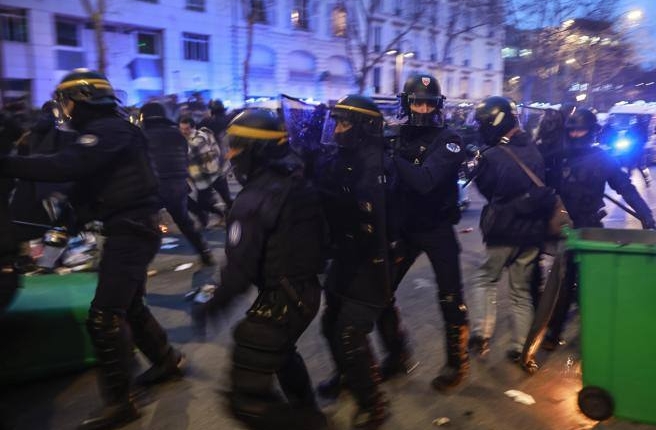Opponents of President Emmanuel Macron’s pension reform are continuing their fight, united for once by trade unions and opposition parties. After Parliament approved the reform by just nine votes, opponents organized a referendum to completely reject the reform as they considered it unfair. A motion for popular consultation has been submitted to the Constitutional Court, which will consider it in a month. Alternatively, opponents can resort to the Constitutional Council, which can refuse to repair the reform in whole or in part. The opposition is expected to intensify its struggle to prevent the implementation of the pension reform in the coming weeks and months, with protests spreading to the main centers of the country. Prime Minister Elisabeth Borne remains in office but could be replaced by another figure in a deep reshuffle that seems inevitable. Macron will remain in the Elysee until 2027, but he needs to find a way to appease popular protests and get out of a deep political crisis.
Macron’s Pension Reform Approved Amidst Protests

Clashes between the police and protesters erupted in Paris near the Assemblée Nationale after the Parliament approved President Emmanuel Macron’s pension reform with just 9 votes. The vote of censure against Elizabeth Bourne’s government gathered 278 votes, just nine short of an absolute majority. As per Article 49.3 of the French Constitution, the government remains in power as long as Parliament approves the reform, which will go into effect on September 1. However, opponents are expected to intensify their struggle to prevent it in the coming weeks and months.
France is currently facing a serious political and social crisis as spontaneous demonstrations are taking place in Strasbourg, Lyon, Toulouse, Dijon, and Lille. The protest spread to the main centers of the country, and students occupied universities in Paris and Bordeaux in protest. Protesters have been chanting slogans such as “Macron resigns” and have been setting rubbish bins on fire.
The debate in the National Assembly was marked by shouts and violent protests, and tensions with the police escalated throughout the evening, resulting in the arrest of seventy people. The protest is expected to intensify with the day of strikes and marches already announced for Thursday, March 23.
Conclusion
Despite the protests, Macron’s pension reform has been approved. The opposition is expected to increase their struggle in the coming weeks and months to prevent its implementation. The protests have escalated to the main centers of the country, and violent clashes have occurred between the police and protesters.
Macron’s Pension Reform Opposed by Trade Unions and Opposition Parties
The government’s narrow margin of victory in approving President Emmanuel Macron’s pension reform has encouraged trade unions and opposition parties to continue their fight against the reform. The lost votes were expected to be 20 or 30, not nine, which has given the opposition hope. The coalition of the radical left, Nupes, immediately appeared with banners that read “On Continue” and “RIP,” or Referendum of Popular Initiative.
Opponents have organized a referendum to reject the reform completely, as it is considered unfair. A motion for popular consultation, signed by 250 deputies and senators and submitted to Assembly Speaker Yael Braun-Biveh, has been sent to the Constitutional Court, which now has one month to consider it. Deputy François Ruffin has also asked Macron not to pass the law, as President Chirac and Prime Minister Dominique de Villepin did in 2006 with the CPE, after four months of violent popular protests.
Another path chosen by the opponents is to resort to the Constitutional Council, which will have to declare itself within a month and may refuse to repair the reform in whole or in part. Prime Minister Elisabeth Borne remains in office, but considers herself a “fuse” and could be replaced by another figure, perhaps the current Home Secretary, Gerald Darmanin, in a deep reshuffle that seems inevitable.
Macron had hoped that the Republicans, the Gaullist right who are not part of the relative majority in government, would support a pension reform that would then be the first step towards a more orderly coalition in parliament until an absolute majority was achieved. This was not the case, as only 61 Republican MPs voted for the reform last week, which is why the government decided to bypass Parliament by resorting to Article 49.3. However, tonight many of them voted on a motion to censure the government, one step away from approval.
Macron will remain in the Elysee until 2027, but he now needs to find a way to appease popular protests and get out of a deep political crisis. Tomorrow morning, a summit has been arranged at the Elysee between Macron, Prime Minister Elisabeth Bourne, and the leaders of the government coalition. In the evening, the majority of parliamentarians will be received by the president.
Don’t miss interesting posts on Famousbio










